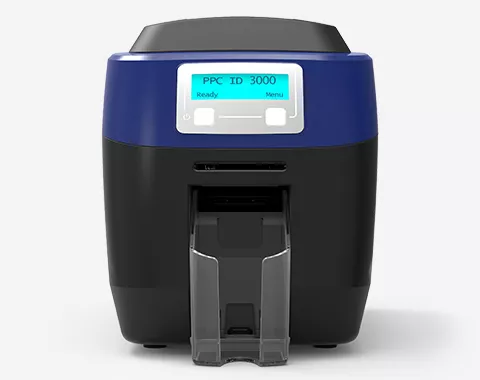
In the world of ID card printing, the battle between paper and plastic has been a topic of debate for quite some time. Each material has its own set of advantages and considerations.
So, whether you’re a business owner, event organizer, or part of an educational institution, understanding the nuances of paper and plastic ID card printers is crucial in making the right choice. Let’s dive into the comparison to help you make an informed decision.
Paper ID Cards vs. Plastic ID Cards: The Face-Off
- Material Durability
Paper: Paper ID cards are undoubtedly economical, but they lack the durability that certain environments demand. They are prone to wear and tear, water damage, and fading over time. If your cards need to withstand frequent use or exposure to the elements, paper might not be the ideal choice.
Plastic: Plastic ID cards, often made from PVC or polyester, are known for their durability. They can withstand rough handling, moisture, and various environmental conditions. If longevity is a priority, plastic cards take the lead.
- Customization Possibilities
Paper: Paper cards offer a basic level of customization, usually limited to printing text, images, and basic designs. They might suffice for simple identification purposes but lack the visual appeal and security features of plastic cards.
Plastic: Plastic cards allow for intricate customization. You can incorporate vibrant colors, holographic overlays, embossing, and even smart card technologies for enhanced security. If you want to create visually striking and secure ID cards, plastic is the way to go.
- Security Features
Paper: Paper cards generally lack advanced security features. They can be easily duplicated or tampered with, making them less suitable for applications requiring a higher level of security.
Plastic: Plastic cards offer a range of security options, including holographic overlays, UV printing, magnetic stripes, and embedded chips. These features make it significantly more challenging to counterfeit or tamper with the cards, ensuring the safety of your identification system.
- Cost Considerations
Paper: Paper ID cards are budget-friendly, making them an attractive option for organizations with limited resources or short-term needs. However, the initial savings might be outweighed by the need for frequent card replacements.
Plastic: Plastic ID cards come with a higher upfront cost due to the materials and technology involved. Yet, considering their durability and security benefits, they offer better long-term value, especially if you factor in reduced replacement costs.
Other Factors to Consider
Ease of Printing: Paper ID card printers are generally simpler to operate and may be sufficient for low-volume, basic printing needs. Plastic card printers, while more sophisticated, might require a bit of a learning curve.
Environmental Impact: Paper ID cards are often considered more eco-friendly due to their biodegradability. However, advancements in eco-friendly plastic card materials are reducing the environmental footprint of plastic cards.
Application: Consider your specific use case. For events or short-term projects, paper cards might suffice. For employee IDs, access control, or membership cards requiring security and durability, plastic is the better choice.
Investment: Assess your budget and the long-term goals of your ID card program. While plastic ID card printers have higher upfront costs, they offer better value over time.
Aesthetics: Plastic cards undoubtedly provide a more professional and polished appearance, which can positively impact your brand image.
Which one – Paper or Plastic ID card printers?
In the paper vs. plastic ID card printer battle, the choice ultimately depends on your organization’s needs and priorities. If cost is a major concern and you don’t require extensive security features, paper might work for you. However, for durability, customization, and advanced security, plastic ID cards are the clear winner. To learn more about ID cards make sure to visit local stores and online..


